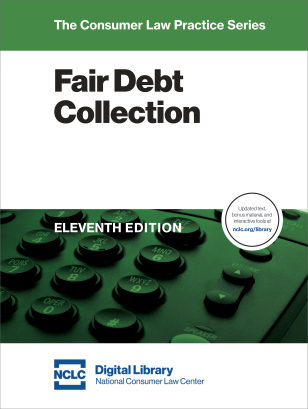In Evankavitch v. Green Tree Servicing, L.L.C., 793 F.3d 355 (3d Cir. 2015), the Third Circuit holds that the mortgage servicer had the burden of persuasion with the jury that the servicer’s call to a third party was permitted by the § 1692b(3) exception. That exception allows follow-up calls to a third party for location information if “...the debt collector reasonably believes that the earlier response of such person is erroneous or incomplete and that such person now has correct or complete location information.” See NCLC’s Fair Debt Collection § 5.3.6 (8th ed. 2014), updated online.
This decision offers a persuasive and detailed justification for this holding that the defendant bears the burden of proving an exemption, repeatedly citing U.S. Supreme Court decisions. The opinion is must reading for anyone arguing not only that the burden is on the defendant to prove exceptions to FDCPA liability, but for exceptions to liability under any statute.
Evankavitch recognizes that the consumer has the burden to show a violation of § 1692c(b) that broadly prohibits debt collector contacts with third parties. On the other hand, § 1692b provides an express exception to this prohibition, relating to obtaining location information from third parties, and the Third Circuit finds that the burden is on the collector to prove that this exception applies, citing a number of U.S. Supreme Court decisions:
The Supreme Court has instructed that … another “general rule of statutory construction” provides “that the burden of proving justification or exemption under a special exception to the prohibitions of a statute generally rests on one who claims its benefits,” FTC v. Morton Salt Co., 334 U.S. 37, 44–45, 68 S.Ct. 822, 92 L.Ed. 1196 (1948); see also Meacham v. Knolls Atomic Power Lab., 554 U.S. 84, 91, 128 S.Ct. 2395, 171 L.Ed.2d 283 (2008) (repeating “the familiar principle that ‘[w]hen a proviso ... carves an exception out of the body of a statute or contract those who set up such exception must prove it’ ”) (quoting Javierre v. Cent. Altagracia, 217 U.S. 502, 508, 30 S.Ct. 598, 54 L.Ed. 859 (1910)); United States v. Taylor, 686 F.3d 182, 190 & n. 5 (3d Cir.2012) (compiling “numerous Supreme Court decisions” for the proposition that “where the statute contains ... an exception, the defendant bears the burden of proving it”). This “longstanding convention is part of the backdrop against which the Congress writes laws, and we respect it unless we have compelling reasons to think that Congress meant to put the burden of persuasion on the other side.” Meacham, 554 U.S. at 91–92, 128 S.Ct. 2395.
Evankavitch describes five federal criteria for shifting the burden of persuasion to the defendant:
- whether the defense is framed as an exception to a statute's general prohibition or an element of a prima facie case;
- whether the statute's general structure and scheme indicate where the burden should fall;
- whether a plaintiff will be unfairly surprised by the assertion of a defense;
- whether a party is in particular control of information necessary to prove or disprove the defense; and
- other policy or fairness considerations.
These criteria should apply more broadly than just to the § 1692b(3) exception allowing follow-up calls to third parties addressed in Evankavitch. They would apply to § 1692b generally, which is an exception to § 1692c(b). Thus the collector would have the burden under §§ 1692b(1), (2), and (6) dealing with identifying oneself and purpose, not mentioning a debt, and communications when the consumer’s attorney is unresponsive.
The broad prohibition in § 1692c(b) of third party contacts also contains three exceptions where the Evankavitch criteria for shifting the burden of persuasion should apply: the consumer’s consent, permission of a court, or as necessary to effectuate a postjudgment judicial remedy. The prohibition and exemptions are examined at NCLC’s Fair Debt Collection § 5.3.5 (8th ed. 2014), updated online.
Ninth Circuit Also Puts Burden on Debt Collector
Similarly, the Ninth Circuit in McCollough v. Johnson, Rodenburg & Lauinger, L.L.C., 637 F.3d 939, 950 (9th Cir. 2011), held that a debt buyer had the burden of proof under § 1692f(1) of establishing that it’s claim for attorney fees in a state debt collection suit was authorized by the credit card agreement. As described in more detail in Fair Debt Collection § 5.6.3, FDCPA §1692f(1) prohibits collection of any amount unless such amount is expressly authorized by the agreement creating the debt or permitted by law.
In the Ninth Circuit case, the debt buyer failed to carry that burden when it could not produce the credit card agreement. A series of lower court decisions in California independently reached the same conclusion as to the burden of proof for § 1692f(1) violations as the Ninth Circuit and followed the same path as Evankavitch: “The burden of proving a statutory exception falls on the party seeking to reap the benefit of the exception.” See Flores v. Collection Consultants of California, 2015 WL 4254032 (C.D. Cal. Mar. 20, 2015); Del Campo v. Am. Corrective Counseling Serv., Inc., 718 F.Supp.2d 1116, 1133 (N.D. Cal. 2010); Schwarm v. Craighead, 552 F.Supp.2d 1056, 1080 (E.D. Cal. 2008); Irwin v. Mascott, 96 F.Supp.2d 968, 980 (N.D. Cal. 1999).
Broad Application
The reasoning and citations in Evankavitch and McCollough should be helpful to consumer litigants claiming any other forms of FDCPA liability containing exemptions. More broadly this precedent will be helpful to any consumer litigation where the defendant alleges that an exemption applies.


